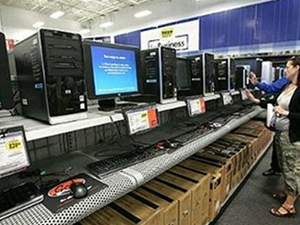



Date:11/10/17
 Global PC shipments fell for the 12th straight quarter with weak back-to-school demand in the US blamed for the decline, according to new figures released by Gartner.
Global PC shipments fell for the 12th straight quarter with weak back-to-school demand in the US blamed for the decline, according to new figures released by Gartner.
The analyst outfit said that worldwide shipments equalled 67 million units for the quarter, indicating a 3.6% year-over-year deterioration. In the US, shipments fell 10% year-over-year, equalling 14.7 million units. This fall was counterbalanced by steadying PC markets in EMEA, Japan and Latin America.
"Business PC demand, led by Windows 10 upgrades, continued to drive PC shipments across all regions, but its refresh schedule varies by region. The countries with stable economies, such as the US, have created a positive sentiment among businesses, especially for small and midsized businesses (SMBs), which are more vulnerable to external events, such as economic or political,” said Mika Kitagawa, principal analyst at Gartner.
In the US, PC shipments totalled 14.7 million units in the third quarter of 2017, a 10.3% deterioration from the third quarter of 2016.
Kitagawa said that weak back-to-school sales were further evidence that “traditional consumer PC demand drivers for PCs are no longer effective”.
"Business PC demand is stable in the US, but demand could slow down among SMBs due to PC price increases due to component shortages,” she added.
HP and Lenovo tied for first place in the PC market based on shipments, with the former on an upward trend with five consecutive quarters of global PC growth. However, Lenovo has had declining shipments in eight of the last 10 quarters.
Gartner also said there were ongoing component shortages, with DRAM shortages, in particular, getting worse during the third quarter of the year compared with the first half of 2017.
"The component price hike impacted the consumer PC market as most vendors generally pass the price hike on to consumers, rather than absorbing the cost themselves," said Kitagawa. "We expect the DRAM shortage to continue to the end of 2018, but it will not be reflected in the final PC prices immediately."
Worldwide PC shipments continue to fall
 Global PC shipments fell for the 12th straight quarter with weak back-to-school demand in the US blamed for the decline, according to new figures released by Gartner.
Global PC shipments fell for the 12th straight quarter with weak back-to-school demand in the US blamed for the decline, according to new figures released by Gartner.The analyst outfit said that worldwide shipments equalled 67 million units for the quarter, indicating a 3.6% year-over-year deterioration. In the US, shipments fell 10% year-over-year, equalling 14.7 million units. This fall was counterbalanced by steadying PC markets in EMEA, Japan and Latin America.
"Business PC demand, led by Windows 10 upgrades, continued to drive PC shipments across all regions, but its refresh schedule varies by region. The countries with stable economies, such as the US, have created a positive sentiment among businesses, especially for small and midsized businesses (SMBs), which are more vulnerable to external events, such as economic or political,” said Mika Kitagawa, principal analyst at Gartner.
In the US, PC shipments totalled 14.7 million units in the third quarter of 2017, a 10.3% deterioration from the third quarter of 2016.
Kitagawa said that weak back-to-school sales were further evidence that “traditional consumer PC demand drivers for PCs are no longer effective”.
"Business PC demand is stable in the US, but demand could slow down among SMBs due to PC price increases due to component shortages,” she added.
HP and Lenovo tied for first place in the PC market based on shipments, with the former on an upward trend with five consecutive quarters of global PC growth. However, Lenovo has had declining shipments in eight of the last 10 quarters.
Gartner also said there were ongoing component shortages, with DRAM shortages, in particular, getting worse during the third quarter of the year compared with the first half of 2017.
"The component price hike impacted the consumer PC market as most vendors generally pass the price hike on to consumers, rather than absorbing the cost themselves," said Kitagawa. "We expect the DRAM shortage to continue to the end of 2018, but it will not be reflected in the final PC prices immediately."
Views: 350
©ictnews.az. All rights reserved.Similar news
- Azerbaijani project to monitor disease via mobile phones
- Innovative educational system to be improved under presidential decree
- NTRC prolongs license of two TV and radio organizations for 6 years
- Azerbaijan establishes e-registry for medicines
- Azerbaijani museum introduces e-guide
- Nar Mobile opens “Nar Dunyasi” sales and service center in Siyazan city
- International conference on custom electronic services held in Baku
- OIC secretary general to attend COMSTECH meeting in Baku
- Azerbaijan develops earthquake warning system
- New law to regulate transition to digital broadcasting in Azerbaijan
- Azerbaijani State Social Protection Fund introduces electronic digital signature
- Intellectual traffic management system in Baku to be commissioned in December
- Tax Ministry of Azerbaijan started receiving video-addresses
- World Bank recommends Azerbaijan to speed up e-service introduction in real estate
- Azerbaijan to shift to electronic registration of real estate





















